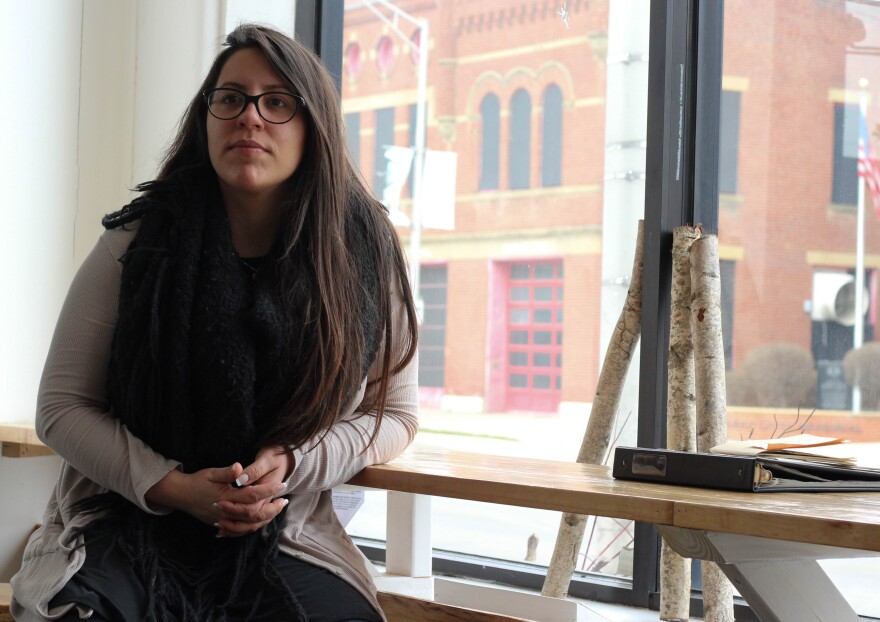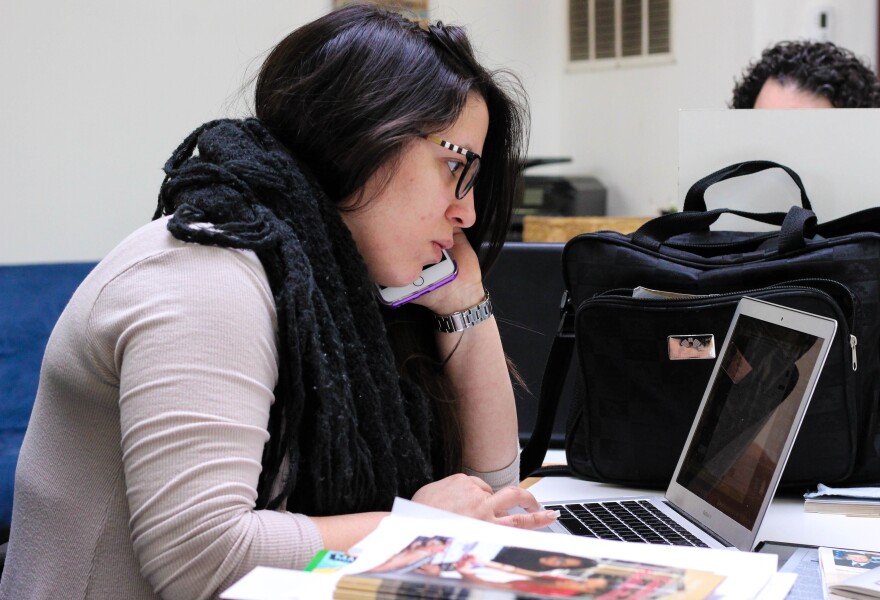Outside an old brick apartment complex, Virginia Nunes Gutierrez pulls two large plastic garbage bags from the trunk of her white Ford Explorer.
“We have a diaper fund so we buy diapers," Nunes Gutierrez explains. “So I have some of those that we were able to get, and also we have some clothes that the church donated.”
Her arms full, Nunes Gutierrez climbs the steps to one front door and knocks. She says this is her third trip to this house.
“Right now we’re with a family who was recently separated," she says. "They’ve been living here in the United States for about 13 years and they’re originally from Guatemala and the dad was just deported.”
A pair of eyes peek out through the blinds. A women, barely five feet tall, cautiously cracks open the front door. She’s been expecting Nunes Gutierrez, but she’s undocumented—and fears deportation herself. WOSU agreed not to refer to her full name, just Perez.
Standing in her living room, Perez carries her four-month-old son on her hip. Her seven-year-old is asleep upstairs.
But there’s someone missing: her husband.
“It feels like life up to this point has ended,” Perez says.
Two weeks ago, her husband was deported back to Guatemala. He had been out running errands when an Immigration and Customs Enforcement agent pulled him over.
After being detained, he petitioned to remain in the U.S. but was denied because he had been living in the country illegally. Previously, he'd been convicted of driving without a license.
In the wake of President Trump's executive order on immigration, people living undocumented in the U.S. face an uncertain future. ICE has reorganized who they prioritize for deportation. That now includes anyone living in the country illegally, even if they haven’t been convicted of a serious crime.
The change in policy has left this Columbus family without their main breadwinner.
Perez has a job cleaning rooms, but without her husband’s income from washing cars, she cannot afford diapers, food, bills, or even rent.
“If [Virginia] hadn’t come with her support, I think I would have already left,” Perez says.
In just a few days, Nunes Gutierrez raised $900 dollars to help Perez pay rent for her apartment. She’s also helped the family connect with an immigration lawyer and organize their paperwork. That way, if it comes down to this, Perez may be able to fight her own deportation.

A community health worker and instructor at The Ohio State University, Nunes Gutierrez first learned of the Perez family by chance. The seven-year-old broke down at school saying immigration had detained her father, and her teacher reached out to Nunes Gutierrez for help.
After connecting with the family, Nunes Gutierrez posted their story to a local Facebook group. The post received dozens of comments and shares from people eager to donate food, money and diapers.
“That’s how we got started, because we saw, 'Wow there’s a lot of support, but how do we channel that?'” Nunes Gutierrez says.
Less than a month later, Gutierrez is already helping three other families. Together with her friends, family and other concerned citizens, Nunes Gutierrez is helping to establish a network for families struggling in the aftermath of a deportation.
By using a private Facebook group and WhatsApp, an encrypted messaging service, she can safely connect with other undocumented individuals to warn of a potential ICE presence, or to distribute resources. She’s also developed an online community where people can donate resources, and a cache of trustworthy immigration lawyers.

At this point, Nunes Gutierrez says the network came together organically, but the group hopes to establish it further by hiring someone to the role of community deportation advocate. Such a position will put undocumented populations in touch with possible resources, she hopes.
“It’s being that frontline person for people that are afraid to get out there, that are really afraid for their wellbeing," Nunes Gutierrez says.
As the daughter of immigrants from Venezuela, Nunes Gutierrez says she can empathize with these families, even though not everyone may agree with what she's doing. She says the goal is to make every community feel safe, regardless of their legal status.
“Our undocumented Hispanic community members are just as worthy of our care as humans as anybody else is,” Nunes Gutierrez says.
Midway through the conversation, Nunes Gutierrez receives a phone call. It’s another family.
The husband has been detained under a 30-year-old charge of driving without a license. His wife is pregnant, she's been left with no income, and they need Nunes Gutierrez's help.





